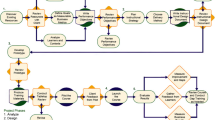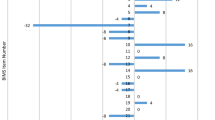Abstract
This paper reports on how teachers within health sciences education translate outcome-based education (OBE) into practice when they design courses. The study is an empirical contribution to the debate about outcome- and competency-based approaches in health sciences education. A qualitative method was used to study how teachers from 14 different study programmes designed courses before and after OBE was implemented. Using an interpretative approach, analysis of documents and interviews was carried out. The findings show that teachers enacted OBE either to design for more competency-oriented teaching–learning, or to further detail knowledge and thus move towards reductionism. Teachers mainly understood the outcome-based framework as useful to support students’ learning, although the demand for accountability created tension and became a bureaucratic hindrance to design for development of professional competence. The paper shows variations of how teachers enacted the same outcome-based framework for instructional design. These differences can add a richer understanding of how outcome- or competency-based approaches relate to teaching–learning at a course level.

Similar content being viewed by others
References
Biggs, J. B. (1996). Enhancing teaching through constructive alignment. Higher Education, 32, 1–18.
Biggs, J. (2003). Teaching for quality learning at University. (Phialdelphia: The Society for Research into Higher Education & Open University Press (Second Edition)).
Bolander, K., Josephson, A., Mann, S., et al. (2006). Teachers promoting expertise in medical education: Understanding the role of the core curriculum. Quality in Higher Education, 12(1), 41–55.
Bruner, J. (1990). Acts of meaning. Cambridge: Harvard University Press.
Creswell, J. W. (2007). Qualitative inquiry and research design. Choosing among five approaches. London: Sage.
Davis, M. H., Amin, Z., Grande, J. P., et al. (2007). Case studies in outcome-based education. Medical Teacher, 29(7), 717–722.
Denzin, N. K., & Lincoln, Y. S. (2003). The landscape of qualitative research. London: Sage.
Elizondo-Montemayor, L., Cid-Garcia, A., Perez-Rodriguez, B. A., et al. (2007). Outcome-based national profile of Mexico’s medical graduates. Medical Teacher, 29(7), 691–698.
Frank, J. R., Mungroo, R., Ahmad, Y., et al. (2010a). Toward a definition of competency-based education in medicine: a systematic review of published definitions. Medical Teacher, 32(8), 631–637.
Frank, J. R., Snell, L. S., Cate, O. T., et al. (2010b). Competency-based medical education: Theory to practice. Medical Teacher, 32(8), 638–645.
Frenk, J., Chen, L., Bhutta, Z. A., et al. (2010). Health professionals for a new century: Transforming education to strengthen health systems in an interdependent world. The Lancet, 376(9756), 1923–1958.
Gadamer, H.-G. (1976). Philosophical hermeneutics. Los Angeles: University of California Press.
Graneheim, U. H., & Lundman, B. (2004). Qualitative content analysis in nursing research: Concepts, procedures and measures to achieve trustworthiness. Nurse Education Today, 24(2), 105–112.
Grant, J. (1999). The incapacitating effects of competence: a critique. Advances in Health Sciences Education, 4(3), 271–277.
Harden, R. M. (2007). Outcome-based education: The ostrich, the peacock and the beaver. Medical Teacher, 29(7), 666–671.
Harden, R. M., Crosby, J. R., & Davis, M. H. (1999b). AMEE Guide No 14: Outcome-based education: Part 1-An introduction to outcome-based education. Medical Teacher, 1(21), 7–14.
Harden, R. M., Crosby, J. R., Davis, M. H., & Friedman, M. (1999a). AMEE Guide No. 14: Outcome-based education: Part 5-From competency to meta-competency: a model for the specification of learning outcomes. Medical Teacher 21(6), 546-552.
Hodges, B. D. (2010). A tea-steeping or i-Doc model for medical education? Academic medicine : journal of the Association of American Medical Colleges, 85(9 Suppl), S34–S44.
Lindblom-Ylänne, S., & Hämäläinen, K. (2004). The Bologna Declaration as a Tool to Enhance Learning and Instruction at the University of Helsinki. International Journal for Academic Development, 9(2), 153–165.
McNeil, H. P., Hughes, C. S., Toohey, S. M., et al. (2006). An innovative outcomes-based medical education program built on adult learning principles. Medical Teacher, 28(6), 527–534.
Morcke, A., Dornan, T., & Eika, B. (2013) Outcome (competency) based education: An exploration of its origins, theoretical basis, and empirical evidence. Advances in Health Sciences Education. 18(4), 851–863.
Morcke, A. M., & Eika, B. (2009). Medical faculty and curriculum design? ‘No, no, it’s like this: You give your lectures…’. Medical Teacher, 31(7), 642–648.
Murphy, M. J., De, A. S. R., Remers, O. J., et al. (2009). Student selected components: Student-designed modules are associated with closer alignment of planned and learnt outcomes. Medical Teacher, 31(10), e489–e493.
Murphy, M. J., Seneviratne, R. D. A., Mcaleer, S. P., et al. (2008). Student selected components: Do students learn what teachers think they teach? Medical Teacher, 30(9–10), e175–e179.
Newble, D., Stark, P., Bax, N., et al. (2005). Developing an outcome-focused core curriculum. Medical Education, 39(7), 680–687.
Norman, G. (2006). Editorial-outcomes, objectives, and the seductive appeal of simple solutions. Advances in Health Sciences Education : Theory and Practice, 11(3), 217–220.
Patton, M. Q. (2001). Qualitative research and evaluation methods. London: Sage.
Ricoeur, P. (1976). Interpretation theory: discourse and the surplus of meaning. Fort Worth: Texas Christian University Press.
Ross, M. T. (2012). Learning about teaching as part of the undergraduate medical curricula: Perspectives and learning outcomes. The Centre for Medical Education. Edinburgh, University of Edinburgh. Doctor of Education.
SFS. (2006:1053). Förordning om ändring i högskoleförordningen 1993:100. Swedish Higher Education Ordinance. Ministry of Education and Research, Government offices of Sweden, Stockholm.
Širca, N. T., Nastav, B., Lesjak, D., et al. (2006). The labour market, graduate competences and study programme development: A case study. Higher Education in Europe, 31(1), 53–64.
Taber, S., Frank, J. R., Harris, K. A., et al. (2010). Identifying the policy implications of competency-based education. Medical Teacher, 32(8), 687–691.
Talbot, M. (2004). Monkey see, monkey do: A critique of the competency model in graduate medical education. Medical Education, 38(6), 587–592.
Whitehead, C. R., Austin, Z., & Hodges, B. D. (2013). Continuing the competency debate: Reflections on definitions and discourses. Advances in Health Sciences Education 18(1), 123–127.
Acknowledgments
The authors wish to thank all teachers that contributed to the study and Helene Wallsten, Maria Westerståhl, Maria Weurlander and Professor Håkan Hult, for their initial involvement in the project.
Author information
Authors and Affiliations
Corresponding author
Rights and permissions
About this article
Cite this article
Barman, L., Silén, C. & Bolander Laksov, K. Outcome based education enacted: teachers’ tensions in balancing between student learning and bureaucracy. Adv in Health Sci Educ 19, 629–643 (2014). https://doi.org/10.1007/s10459-013-9491-3
Received:
Accepted:
Published:
Issue Date:
DOI: https://doi.org/10.1007/s10459-013-9491-3




